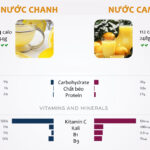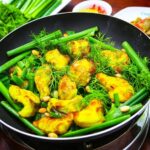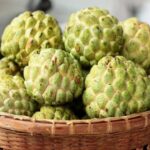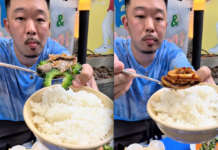Guava is a fruit that is widely cultivated in Vietnam, bearing fruit year-round. In the market, in addition to the common guava, there are also Taiwanese guava, lemon guava, seedless guava, and red-fleshed guava, with prices ranging from 10,000 to 40,000 VND per kilogram, depending on the variety.
According to Polyclinic Doctor Bui Dac Sang, from the Vietnam Academy of Science and Technology, guava is a fruit rich in vitamins, especially vitamin C. Statistics show that 100g of guava contains 1g of protein, 15mg of calcium, 1mg of iron, 0.06mg of retinol (vitamin A), 0.05mg of vitamin B1, and 228mg of vitamin C. Guava is also a fruit that is high in fiber and low in saturated fat, cholesterol, and sodium. Therefore, regular and proper consumption of guava is beneficial for cardiovascular health, enhances brain function, promotes oral health, and boosts the immune system.
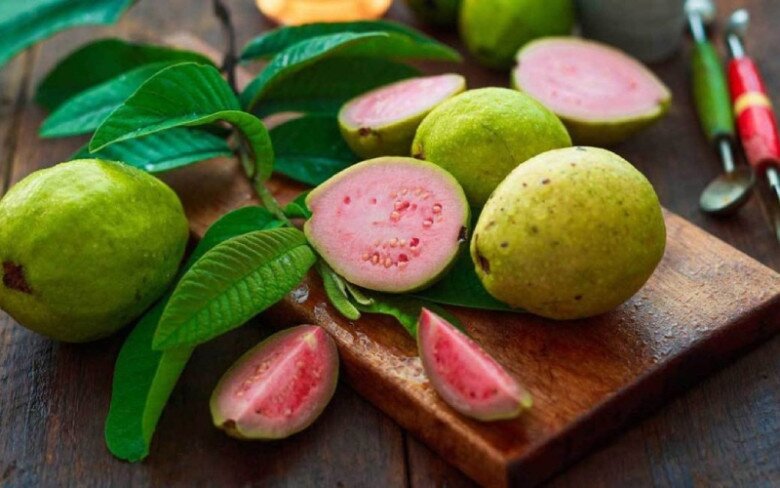
Guava is a fruit that is widely cultivated in Vietnam. Photo illustration.
Dr. Nguyen Trong Hung, Head of the Adult Nutrition Counseling Examination Department at the National Institute of Nutrition, concurred with this view and added that the vitamin C content in guava is four times higher than that of oranges. According to Dr. Hung, in the current situation with an increasing number of cases of measles, dengue fever, hand, foot, and mouth disease, and colds, feeding guava to children will help boost their immune system during the back-to-school season.
According to Dr. Hung, vitamin C in guava, also known as ascorbic acid, aids in immune support and fights infections such as colds and accelerates wound healing. Vitamin C is also known as an antioxidant that protects cells from free radical damage. Free radical cell damage can lead to cardiovascular disease, cancer, and other chronic illnesses. The human body cannot produce vitamin C on its own, nor can it store it, so it is necessary to incorporate vitamin C-rich foods into the daily diet.
Vitamin A in guava is beneficial for healthy vision. Additionally, the antioxidant properties of guava help enhance the body’s immune system and reduce the risk of cancer. Guava also helps prevent diseases caused by free radicals (ROS), such as Alzheimer’s, Parkinson’s, and other disorders like hyperoxia and inflammation.
The abundant fiber in guava improves digestion in children and prevents constipation, appendicitis, diarrhea, and dysentery. This fruit also contributes to blood regeneration in the body.

Regularly feeding guava to children will help boost their immune system and reduce the risk of anemia. Photo illustration.
Doctor Nguyen Thanh Sang shared that he has treated many children with anemia and iron deficiency due to improper care. “For children over one month old, in addition to recommending that parents provide their children with adequate nutrition, I also suggest feeding them guava by peeling, deseeding, cutting into pieces, and blending into a smoothie or extracting the juice,” said Doctor Sang.
According to Doctor Sang, guava contains four times more vitamin C than oranges, and it is also inexpensive and readily available in the market. It serves as a great “natural vaccine” for children, especially during the back-to-school season, when there is an increase in cases of measles, hand, foot, and mouth disease, and dengue fever.
Precautions when eating guava
According to doctors, while guava is a nutritious fruit rich in vitamin C and other essential nutrients, there are some precautions to be aware of to avoid any negative impact on health.
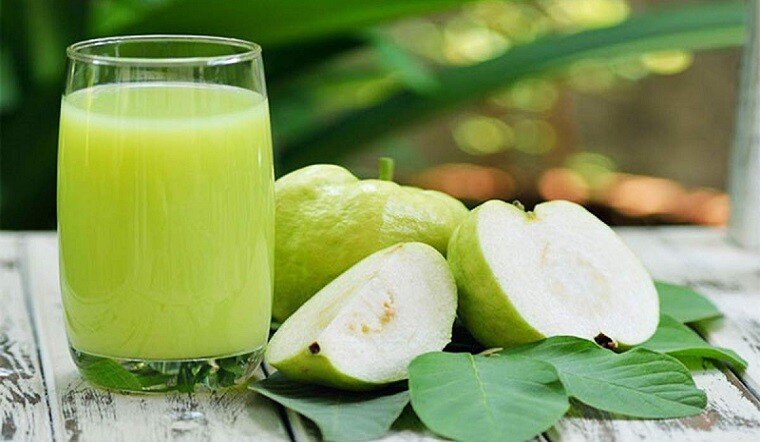
For children under two years old, it is recommended to give guava juice two to three times a week. Photo illustration.
– Do not feed unripe, green guava to children. The nutrients in guava are most effective when the fruit is ripe. Consuming unripe guava can affect the digestive system and cause constipation.
– Avoid feeding guava seeds to children, as they are difficult to chew (grind) thoroughly. “If you can chew the guava seeds thoroughly, they can be a good source of fiber, but children may easily swallow the seeds whole, which can affect their digestion as the stomach cannot grind or break down the seeds,” warned Polyclinic Doctor Bui Dac Sang.
– It is recommended to feed the guava peel to children only if the fruit is grown, cared for, and harvested safely, ensuring a rich source of vitamins and minerals. If there is any doubt about the safety of the guava, it is advisable to peel and discard the skin before consumption.
– When feeding guava to children, cut it into small pieces. For children under two years old, it is preferable to extract the juice or blend it into a smoothie.
– Feed children a moderate amount of guava, and for guava juice, limit it to two to three times a week. If the child exhibits any signs of an allergic reaction, such as itching, rash, or swelling, discontinue feeding guava and seek medical advice promptly.
Herbs Contain More Vitamin C Than Oranges, Priced at 90,000 VND per kg – But There’s a Catch.
“Besides being richer in vitamin C than oranges, cilantro is packed with antioxidants that help prevent hypertension, diabetes, and other chronic illnesses.”


























